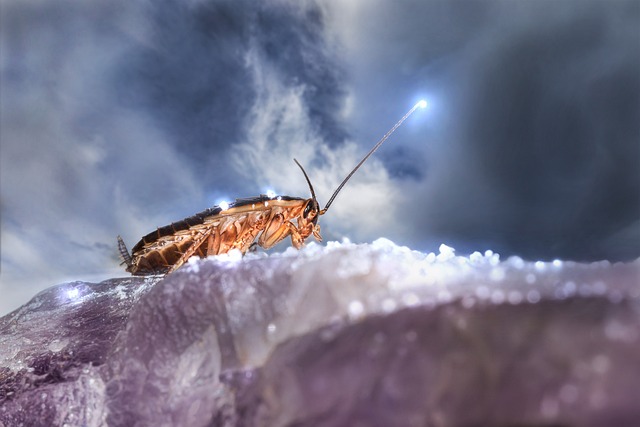Of all of the household pests, German cockroaches are among the worst. From their disease-spreading ways to their quick reproduction rates, these pests wreak havoc in homes nationwide.
However, if you’ve seen one scurry past, it may leave you wondering: “What other damage can they do?”
Do German roaches bite?
In our blog, we’ll delve into the nuances of their habits to provide homeowners with a thorough understanding of the potential interactions and risks associated with these pests. Join us as we navigate the complexities of German roach behavior and see if they live up to their reputation!
German Cockroaches: Everything You Need to Know!
Flourishing in warm and humid environments, these pests have carved a niche for themselves in residential spaces. Your unwanted roommate can cozy up anywhere from kitchens and bathrooms to basements and appliances.
Take a look to learn more about why German roaches choose your home as their breeding ground of choice.
The Art of Adaptation
German roaches, being nocturnal creatures, conduct their foraging under the cover of night, making it challenging for homeowners to detect and address infestations promptly.
Their small and flat bodies also give them the uncanny ability to infiltrate even the tiniest cracks and crevices, creating numerous hiding spots that thwart traditional pest control methods.
Adding to the challenge, these roaches are prolific breeders, quickly replenishing their population after implementing control measures.
Moreover, certain populations of German roaches have developed resistance to store-bought pesticides over time. This adaptability necessitates professional interference to eliminate these hardy insects.
Warmth and Humidity
One defining characteristic of German roaches is their affinity for warmth and humidity. Unlike some pests that avoid such conditions, these roaches thrive in them. Residential spaces become their ideal habitat, with the optimal blend of warmth and humidity creating an environment conducive to their survival.
Residential Havens
The deliberate choice of residential spaces as their ideal habitat is not coincidental. German roaches have evolved to coexist with human activities, finding refuge in areas with abundant food sources. Kitchens, with their proximity to food, become primary dwelling grounds as the roaches sneak into cabinets and pantries for crumbs.
These pests aren’t picky either. They can consume various organic matter, including food crumbs, grease, and even non-food items. This adaptability in their diet allows them to find sustenance in multiple environments, making it challenging for homeowners to eliminate potential food sources.
Do German Roaches Bite?
So we know all the dirty details about German cockroaches, but the burning question remains: Do German roaches bite?
Not really! These pests are more concerned about finding their next meal in your kitchen than attacking you. They’re more scared of you than you are of them! In fact, they’re more dangerous when they spread harmful bacteria around your kitchen and home.
However, they may exhibit odd feeding behaviors in dire circumstances. These bites are not predatory or aggressive acts but can occur if the roaches are hungry or lack other food sources.
German roaches, by nature, are more inclined to feed on decaying organic matter, food crumbs, and other debris in their environment. Their mouthparts are adapted for scavenging rather than inflicting bites on humans. But in situations where their usual food sources are scarce, they might explore alternative options, including munching on dead skin flakes and hair.
It’s important to emphasize that these instances are rare, and the nibbling behavior of German roaches is not a common concern. The primary focus should still be addressing the root causes of a roach infestation, such as eliminating food sources, improving sanitation, and implementing effective pest control measures.
Do German Roaches Bite Pets?
Similar to their approach to humans, German roaches don’t seek out your furry friends as a meal either. Again, they primarily focus on raiding your garbage can or eating leftover food scraps.
German roaches would prefer to nibble on other available food sources like pet food, waste, or hair before trying to take a bite out of the source. But if times are tough and you have a substantial infestation, they could theoretically turn to your dog or cat for loose hair and dead skin.
Identifying Signs of a German Roach Infestation
While German roaches aren’t known to bite, their presence in the home can still pose significant issues. Here are some common indicators you have an infestation:
- Fecal Droppings: German roach droppings resemble tiny, dark specks and are often found in areas frequented by these pests.
- Musty Odor: Infestations can produce a musty or unpleasant odor, particularly in enclosed spaces where roaches congregate.
- Egg Casings: German roach egg casings, known as oothecae, may be discovered in hidden spaces. Each casing can contain multiple eggs, contributing to rapid population growth.
- Nocturnal Activity: German roaches are nocturnal, and sightings during the day may indicate a significant infestation.
- Shed Exoskeletons: As roaches grow, they shed their exoskeletons. Finding these discarded shells is a sign of active infestation.
Keeping German Roaches at Bay
Effective prevention strategies can significantly reduce the likelihood of a German roach infestation and create a healthier living environment. Let’s explore critical preventive measures:
- Maintain Cleanliness: German roaches thrive in environments with access to food crumbs, spills, and debris. Regularly clean kitchens, dining areas, and storage spaces to eliminate potential food sources that attract these pests.
- Seal Entry Points: Seal any cracks, gaps, or crevices in walls, windows, and doors. German roaches are adept at finding entry points, and sealing these openings serves as a barrier, preventing their infiltration into your home.
- Proper Food Storage: Store food items in airtight containers to deny German roaches easy access to potential food sources. This includes pet food, which should also be sealed to minimize attraction.
- Remove Standing Water: Address any water leaks promptly, as German roaches, like many pests, are attracted to moisture.
- Regular Inspections: Conduct regular inspections of potential hiding spots, such as under appliances, in cabinets, and around plumbing fixtures. Early detection can lead to timely intervention, preventing the escalation of an infestation.
- Professional Pest Control: Rely on the services of a professional pest control company, like United States Pest Service, for routine inspections and preventive treatments. Professional expertise ensures a comprehensive approach to pest management, addressing potential vulnerabilities in your home.
So, do German roaches bite? While they can, these pests probably won’t cause you that trouble. However, when you have an infestation, that’s the last thing you should worry about!
Instead, call the experts here at United States Pest Service to eliminate any roach species overtaking your home. Contact us today!

